Tom's Guide Verdict
For great sound in a uniquely designed, completely wireless package, TicPods Free are worth a look. But if you have $30 extra to spend and own an iPhone, get Apple's AirPods.
Pros
- +
Multiple colors to choose from
- +
Lengthy battery life
- +
Solid sound with noise isolation
Cons
- -
Light indicators for battery levels
- -
Could use in-app audio personalization controls
Why you can trust Tom's Guide
Apple's little white AirPods are now ubiquitous, despite their nerdy looks. So wire-free Bluetooth earbuds that replicate Apple's stem design are popping up all over. Some AirPod alternatives are cheap knock-offs that are definitely not worth the low price tag, but others are worth considering. Mobvoi's $129 TicPods Free fall in the latter camp.
Mobvoi, a Chinese artificial intelligence company funded by Google and Volkswagen (among other backers), is best-known for its line of affordable Wear OS smartwatches. With TicPods, the company is expanding into audio, and the results are impressive.
Design
TicPods resemble AirPods, sort of. They share the same stem design, which looks weird as hell no matter who's using them. It eventually grows on you; just don't look in any mirrors (or train windows). That design allows for gesture controls using taps and swipes on the stem.
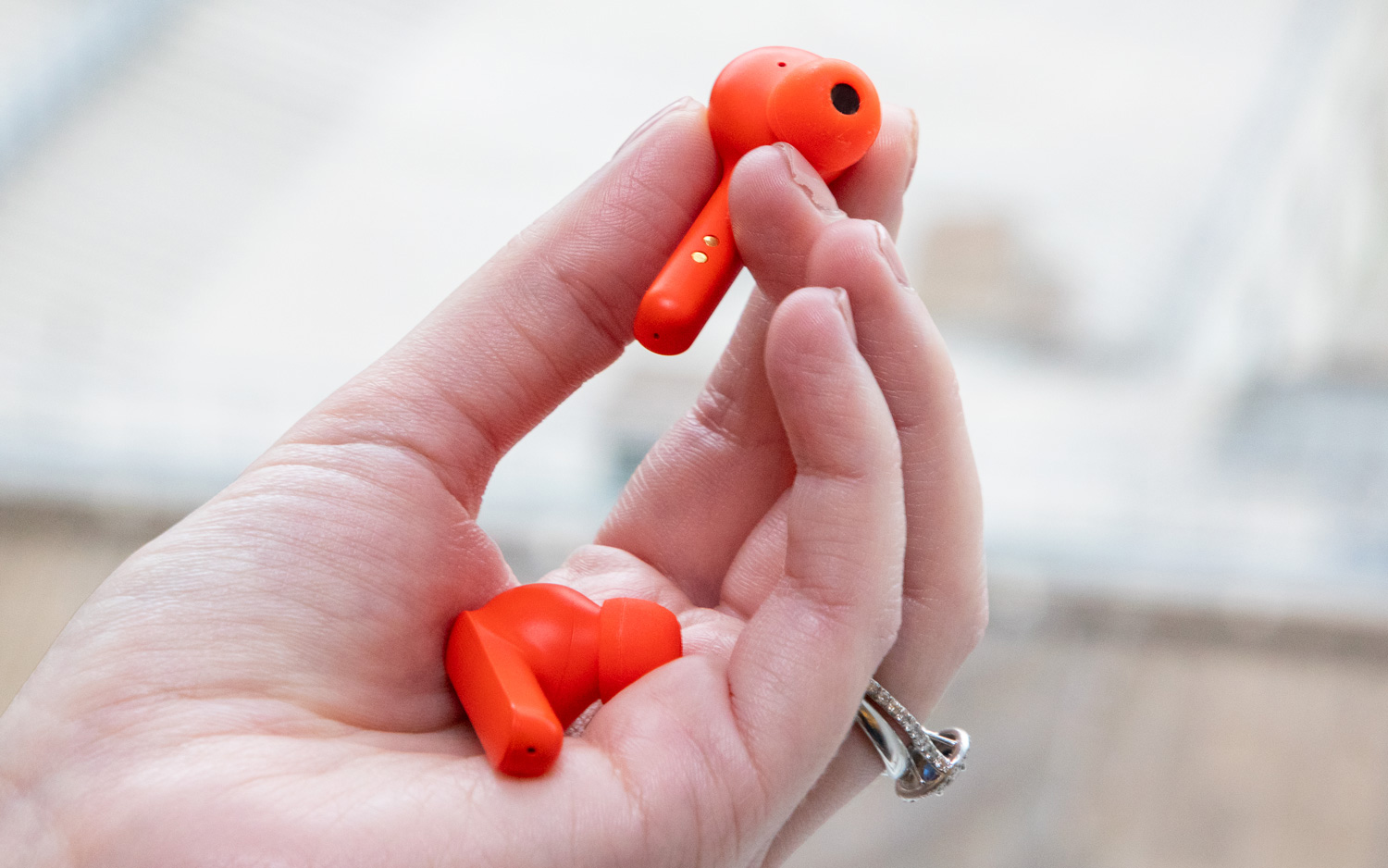
Aside from the stems, which are similarly shaped and the same length, TicPods are more bulbous, like AirPods swollen from heat. They also have a protruding tip, which AirPods do not, so they fit more snugly in your ear. Mobvoi includes two silicone tip sizes in the box to customize the fit, though more sizes would be useful. (Most Bluetooth earbuds come with three to choose from.)
TicPods come in three shades: white, navy and neon red called Lava that's so bright you can see it from just about anywhere.
Unlike AirPods, TicPods come in three shades: white, navy and neon red called Lava that’s so bright you can see it from, well, just about anywhere. This is the model I tested, and let me tell you, it's not for the faint of heart. If you don't want to draw any attention to yourself, get the white version instead.
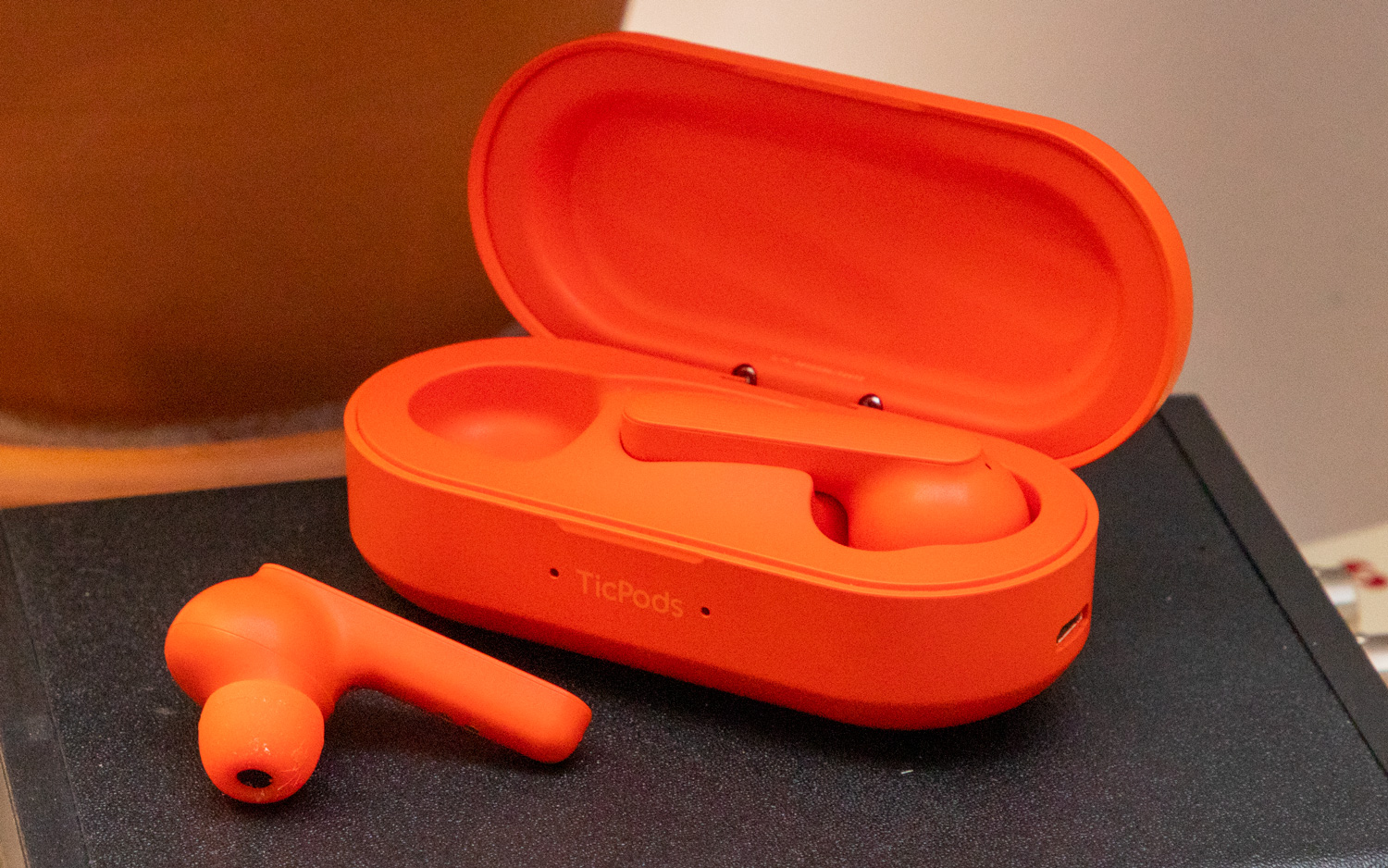
Like every other pair of completely wireless buds, TicPods come in a charging case that not only store the pods, but juice them up in between listening sessions. Each shade of TicPods comes with a case in a corresponding hue, so the neon red earbuds I wore came with an equally vibrant (some might say obnoxiously so) case. The case and buds are made of smooth, matte plastic, which doesn't look as premium as the glossy AirPods, but has enough heft to feel secure in the ear.
Fit
The TicPods' unique shape help them fit more securely in your ear. AirPods don't work for some people because of the round design of the buds themselves, which can't be customized with silicone or foam tips.
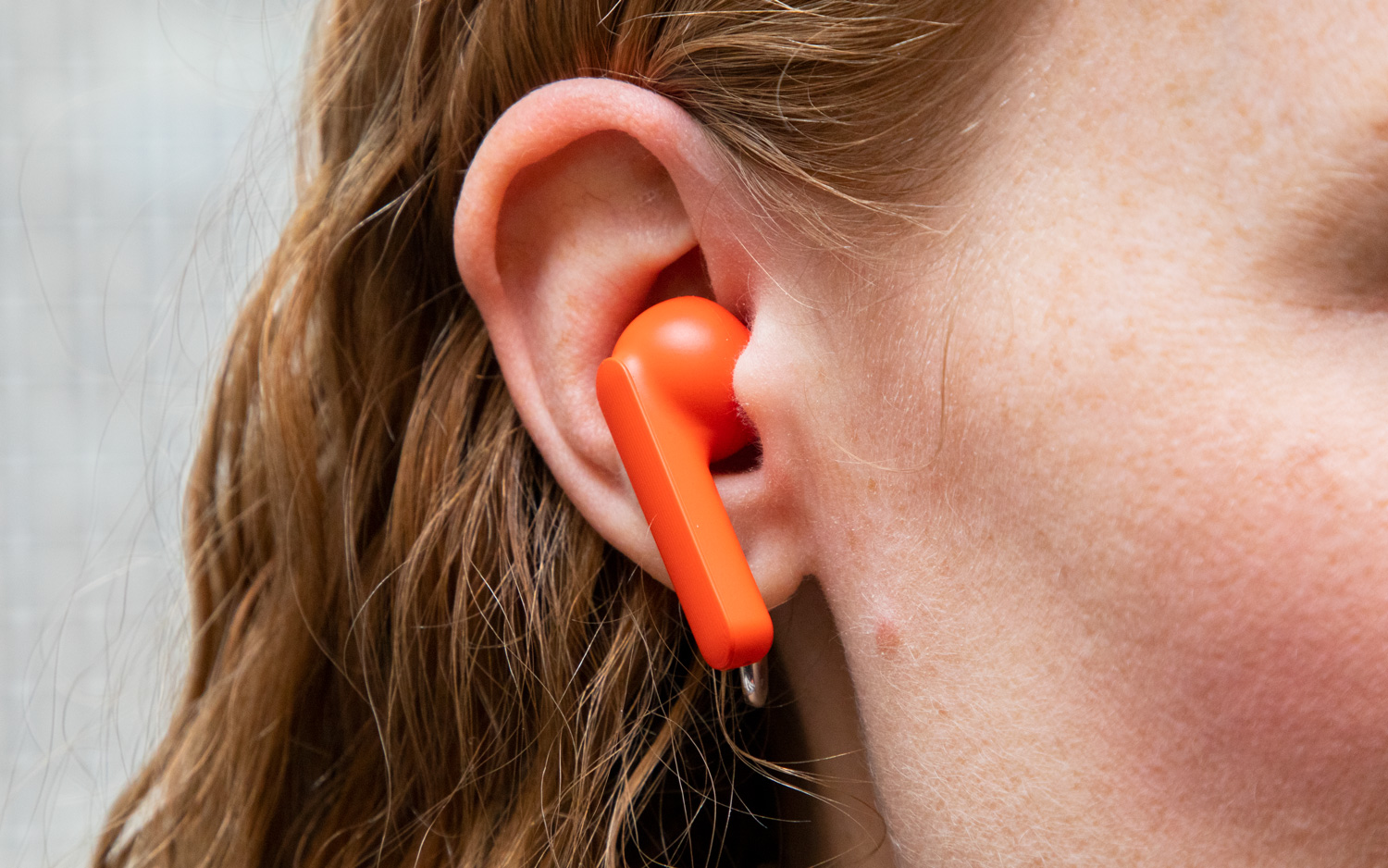
TicPods come with large tips attached out of the box, with a small pair included in a plastic bag alongside them. The small ones worked for me, though a medium option would make the TicPods more versatile. The tips help wedge the buds further into your ear, and the silicone seals the fit and aids in noise isolation.
The TicPods’ unique shape help them fit more securely in your ear.
At first, TicPods felt a little bizarre in my ear, but I quickly grew accustomed to them. They were comfortable to wear for extended periods of time, including lengthy commutes and phone calls.
Sound
When you put a TicPod in your ear, you hear the "bloop bloop" of the bud powering on and connecting to your phone's Bluetooth. Once both earbuds are in, you'll resume whatever you were last listening to. Like AirPods, TicPods pause what you're listening to when you take one bud out of your ear, then resume when you put it back in.
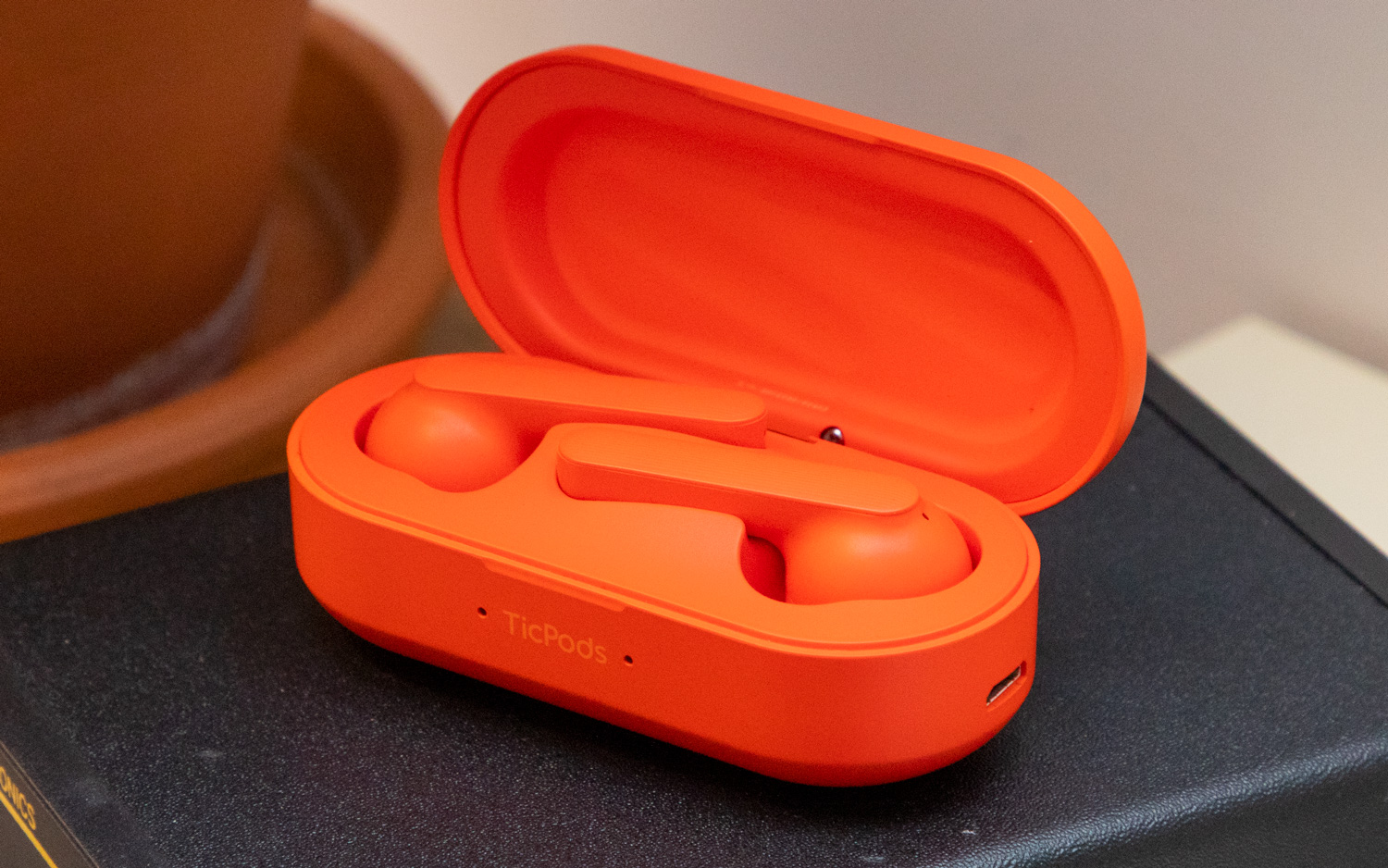
I used my TicPods for two weeks, running in blustery winds to my bass-heavy workout playlists, listening to podcasts during commutes on the screeching New York City subway and talking to my mom while I puttered around the kitchen. In every scenario, TicPods came in loud and clear. I do wish they were a little heavier on the bass, but, unfortunately, the Mobvoi app you use to pair TicPods to your phone doesn't offer any audio customization features.
TicPods don’t block out ambient noise, but their shape helps isolate noises so you can hear more clearly.
Every weekday morning, I walk down to my crowded subway platform, listening to my favorite podcast, The Daily. When I do this with my AirPods, I have to pause the episode every time a train screeches through the station, because the C train is from the 1940s and sounds like it may careen off the rails at any moment. AirPods let in every bit of that sound. With TicPods, I can keep listening without a problem.
MORE: Headphones and Earbuds - Reviews and Top Picks
TicPods don’t block out ambient noise, but their shape helps isolate noises so you can hear more clearly. When making calls, noise-cancelling tech in both pods' microphones quiets the din.
Controls
TicPods respond to taps and swipes, which makes it easy to control your music without using your phone. To skip to the next song, double-tap either pod. You can pause by touching the left earbud and pressing for 2 seconds. The same action on the right earbud calls up your voice assistant — Siri, Alexa or Google Assistant, depending on which is set up on your phone. To control the volume, slide up or down on each pod's stem. All of these gestures worked well, though I wish the Mobvoi app allowed for more customization — for instance, a gesture for playing the previous song. Still, the basics work just fine.
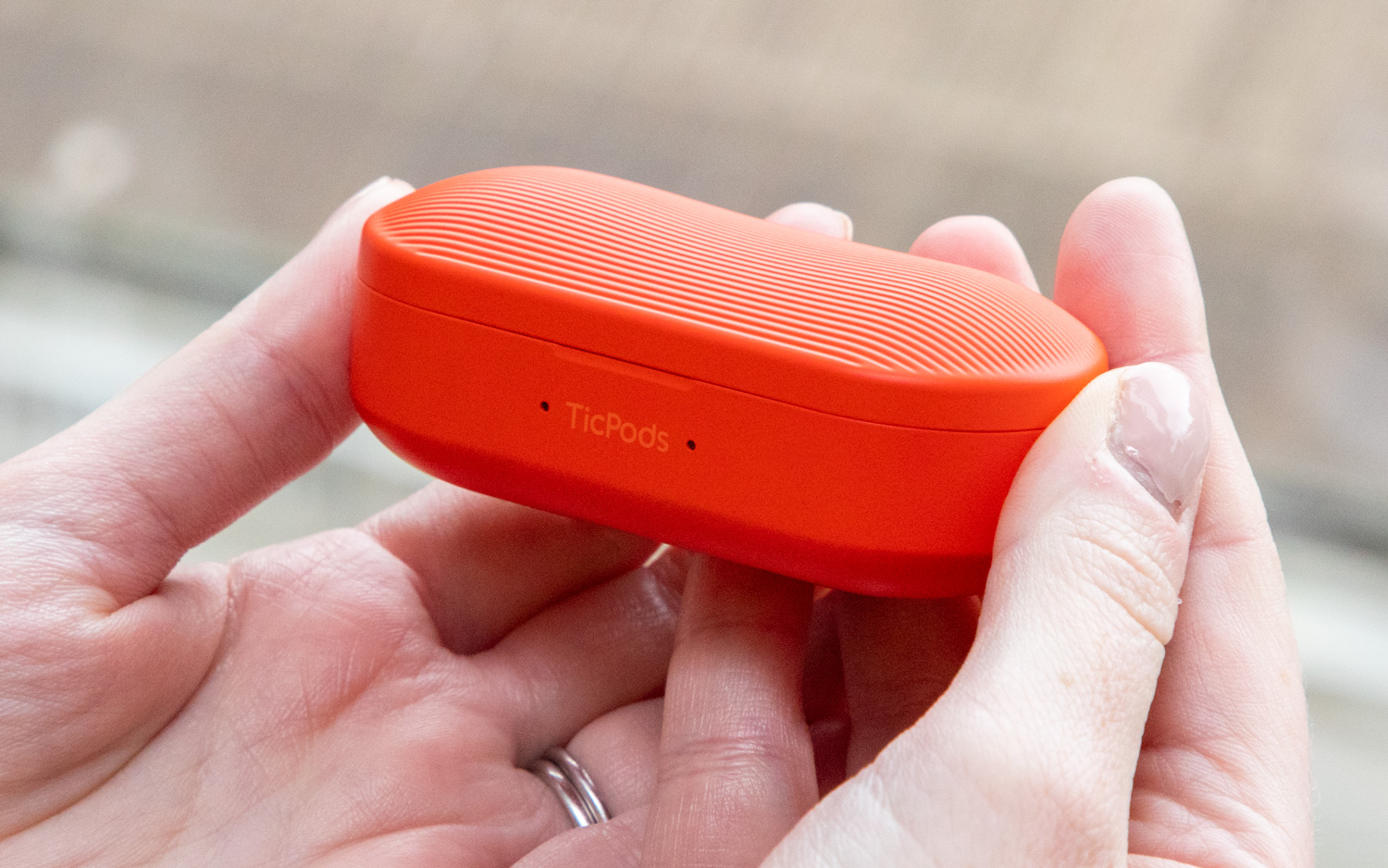
Gestures function differently when making phone calls. You can answer and end a call with a double-tap on either bud, slide up or down on the stem to adjust the volume and reject a call by pressing and holding for 2 seconds. Again, this is all easy to remember and works well.
Battery Life and Bluetooth
After two weeks of wear, my TicPods finally made a pitiful noise and powered off, dead at last. The charging case? Also dead. Mobvoi says the earbuds can last 4 hours on a charge, and up to 18 hours when you use the charging case to juice up in between listening sessions. Those claims held up in my testing.
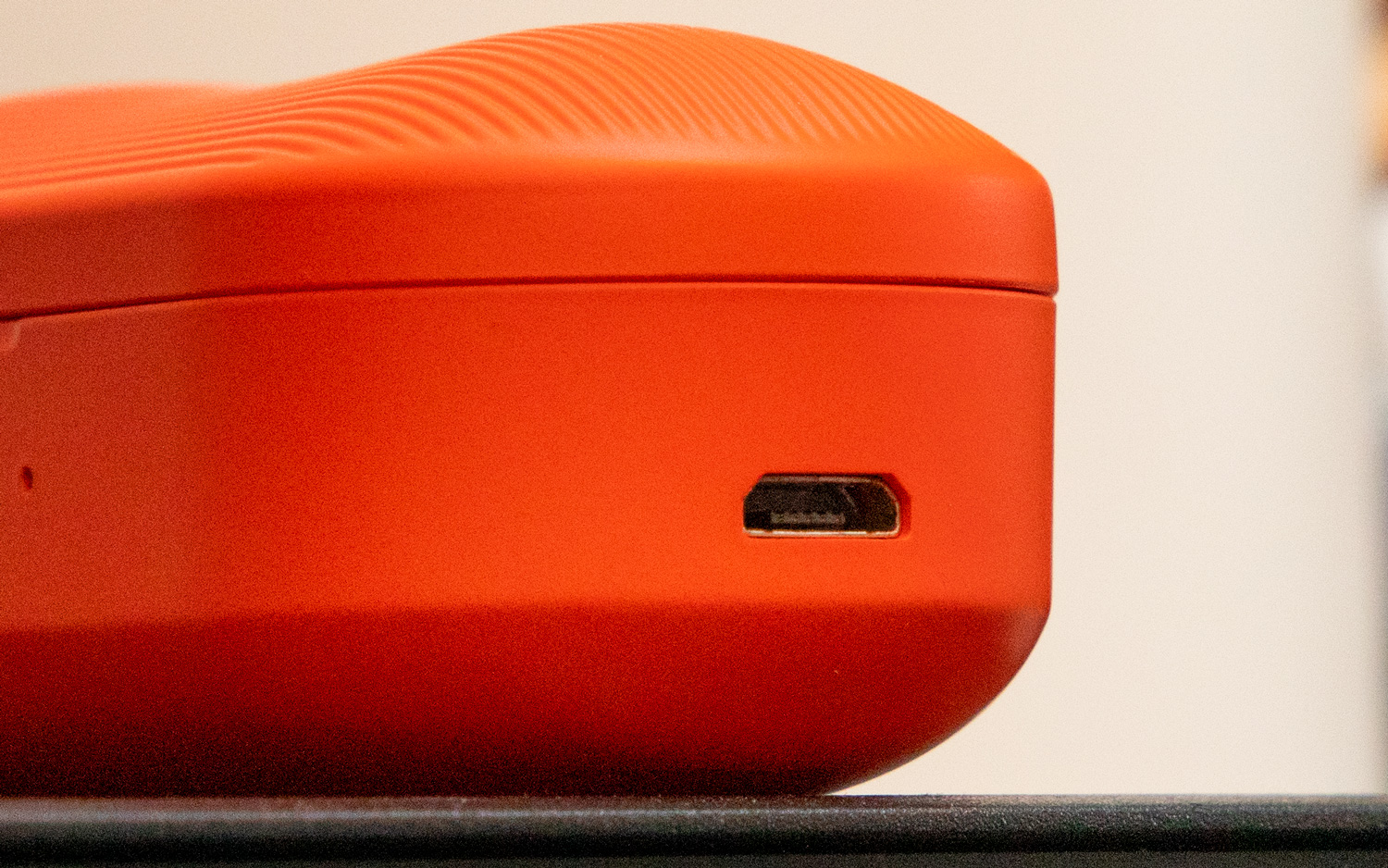
TicPods use LED light indicators to indicate how charged the pods and case are, but I wish there was a more precise way to tell just how much life was left. If the LED lights on the pod stems are flashing red when you remove them from the case, there's less than 10 percent battery left in them. That's not exactly helpful, because there could be just 2 percent left and your pods will die mid-commute (which is exactly what happened to me).
You can view a slightly more precise battery percentage estimate on your phone — on the iPhone, this can be found on the Spotlight screen a swipe right from the home screen — but only for the pods. The case doesn't connect to your phone, so you can't see its battery life percentage. Instead, you have to open the case. If the lights on the front are green, then the battery has more than 10 percent life left. If the lights are red, there's less than 10 percent left. Again, I wish this were more precise.
TicPods vs. AirPods
As an iPhone owner, I prefer wearing AirPods. They pair seamlessly with my phone, they fit well and they sound great. I also prefer the AirPods charging case, which is smaller than the TicPods case and has its own Bluetooth connection, so I can easily view battery life percentage for the case and each pod.
MORE: Apple AirPods Review: Almost Magical
But TicPods are cheaper by $30, which is something to consider. And the noise-isolating design is a huge plus for jamming out in noisy areas.
Bottom Line
TicPods don't offer quite as magical an experience as you get from Apple's AirPods, which are so seamlessly integrated with an iPhone that it's practically effortless. No other completely wireless earbuds for Android replicate that experience, though Samsung's Gear IconX ($149) come close for Galaxy device users. TicPods also can't quite match the battery life AirPods offer, though they were almost as impressive.
TicPods cost $30 less than AirPods, which is an appealing price with minimal trade-offs. If you don't have an iPhone, they're an even better option, because AirPods don't offer the same experience to Android users. TicPods are compatible with Google Assistant and Alexa, which also makes them more useful to Android users.
Credit: Tom's Guide
Caitlin is a Senior editor for Gizmodo. She has also worked on Tom's Guide, Macworld, PCWorld and the Las Vegas Review-Journal. When she's not testing out the latest devices, you can find her running around the streets of Los Angeles, putting in morning miles or searching for the best tacos.
